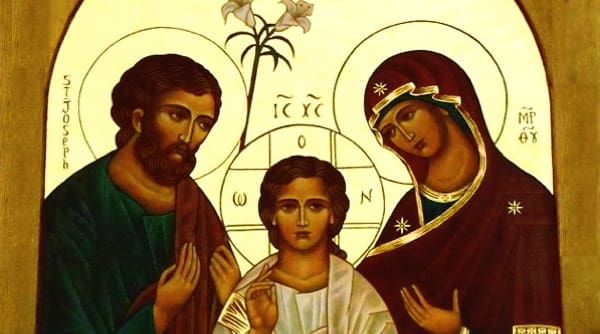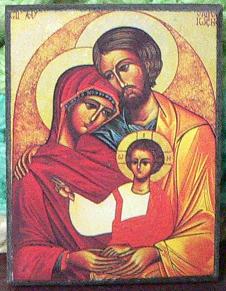Now we are in the Christmas Octave to continue
reflecting what it means to have the Logos-Theos
incarnated (John 1:1) to dwell among us (John 1:14). This God incarnate is,
indeed, Emmanuel (Matthew 1:23; Isaiah 7:14, 8:8; cf. Matthew 28:20), which
means “God with us”, named Jesus (Matthew 1:25), which means “יה (yah), Yahweh
(יהוה), will save”. The Father in heaven
has sent him to us as our Messiah King out of his salvific love (John 3:16).
Yes, the Nativity of the Lord, the very first theophany by the incarnation of
the Logos-Theos, is indeed the very
first sacramental manifestation of God’s חסד (chesed), steadfast covenant love,
for us!
The Sunday following the Nativity feast of the Lord
(Christmas Day), during the Christmas Octave, is the feast Sunday of the Holy
Family, as instituted by Pope Leo XIII in 1893. This suggests that the Nativity
of the Lord must be celebrated, appreciated, and understood, in the context of
the Holy Family, not only during the Christmas Octave but throughout the entire
Christmastide. And, the Holy Family, to which Christ was born, represents what
Christian families are to be.
So, what is the nature of the Holy Family that
Christian families can model?
It is, indeed, the steadfast faith in God, leading
to obedience to God’s will.
As Luke 1:38 describes, Mary demonstrated her faith
in God through her obedience to God’s will for her to be the Theotokus, while she was betrothed to
Joseph but not yet consummated her engagement into matrimony. Finding out of Mary’s out-of-wedlock
pregnancy, Joseph was planning to divorce her quietly as it is not legal to
marry a woman pregnant with a child, who is not his, but loved her enough to
protect her from legal consequence, which is a death penalty (Matthew 1:18-19).
Then, Joseph learned from Angel Gabriel, who made the Annunciation of her
virgin pregnancy to her, that Mary was made pregnant by the power of the Holy
Spirit according to God’s will (Matthew 1:20-23). To this, Joseph responded
with his obedience and welcomed Mary as his wife and the son in her womb as his
step son (Matthew 1:24-25), because Joseph is just as obedient to God as his
wife, Mary, is. The obedience that both Mary and Joseph have demonstrated
reflects their uncompromising faith.


Jesus was born to this faithful couple, Mary and
Joseph, whose faith made them obedient to God. Therefore, it is evident that Jesus’
absolute faithfulness and obedience to the Father and His will (John 4:34,
5:30, 6:38, 8:26, 10:18, 12:49-50, 14:30-31, 15:10; Matthew 26:39//Mark
14:36//Luke 22:42; Luke 23:46; Philippians 2:8) was affected by the obedience
of Mary and Joseph during his formative years in the Holy Family.
See, not only Mary and Joseph but Jesus are all
faithful, and therefore, obedient to God the Father.
Faith, which leads to obedience, is associated with
hope and love (1 Corinthians 13:13; 1 Thessalonians 5:8). Therefore, the steadfast
faithfulness of the Holy Family, demonstrated by Mary, Joseph, and Jesus, also
means that hope and love are other characteristic of this family to which we
are to model.
As Christian families are becoming more like the Holy Family in regard to the
steadfast faith, not only we become more obedient to God’s will but, as St.
John Paul II has put it in his apostolic exhortation, “Familiaris Consortio”, our
families can serve as more powerful and efficacious agents of Christian hope
and love.


Remember, there is the Holy Family because Mary, the wife, and Joseph, the husband, are both faithful and therefore obedient to God's will. Otherwise, the Son of God, the Messiah King, would not have been born in the human flesh of Jesus and nurtured by this Holy Couple. Christian families are to be the placed where children are born and nurtured to grow like Jesus.
During this Christmastide, may all Christian
families throughout the world grow more like the Holy Family in regard to the
steadfast faith, leaning to obedience in association with hope and love, so
that the salvific spirit of Christmas is embodied, reflected and radiated through
our Christian families.
No comments:
Post a Comment